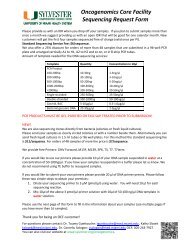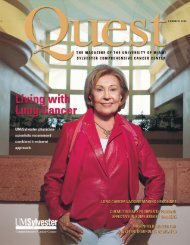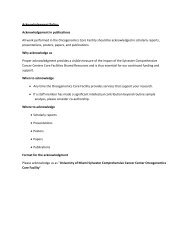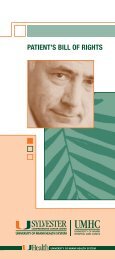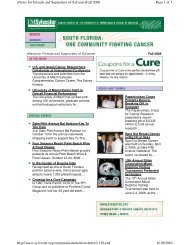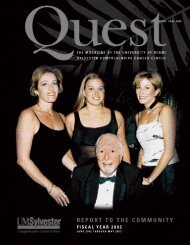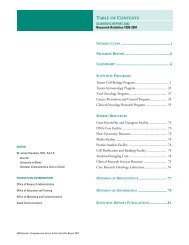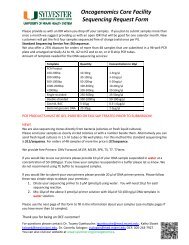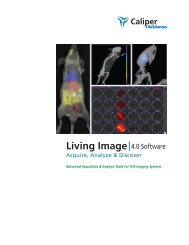SCIENTIFIC REPORT 2004 - Sylvester Comprehensive Cancer Center
SCIENTIFIC REPORT 2004 - Sylvester Comprehensive Cancer Center
SCIENTIFIC REPORT 2004 - Sylvester Comprehensive Cancer Center
Create successful ePaper yourself
Turn your PDF publications into a flip-book with our unique Google optimized e-Paper software.
C L I N I C A L O N C O L O G Y R E S E A R C H P R O G R A M<br />
SELECTED PUBLICATIONS<br />
2002<br />
Singal, R, vanWert, JM, and Ferdinand, L Jr.<br />
Methylation of alpha-type embryonic globin gene<br />
alpha pi represses transcription in primary erythroid<br />
cells. Blood 100:4217-22, 2002.<br />
Singal, R, Wang, SZ, Sargent, T, Zhu, SZ, and<br />
Ginder, GD. Methylation of promoter proximal<br />
transcribed sequences of an embryonic globin<br />
gene inhibits transcription in primary erythroid<br />
cells and promotes formation of a cell type-specific<br />
methyl cytosine binding complex. Journal of<br />
Biological Chemistry 277:1897-1905, 2002.<br />
Noss, KR, Singal, R, and Grimes, SR. Methylation<br />
state of the prostate specific membrane antigen<br />
(PSMA) CpG island in prostate cancer cell<br />
lines. Anticancer Research 22:1505-11, 2002.<br />
2003<br />
Yaturu, S, Harrara, E, Nopajaroonsri, C, Singal,<br />
R, and Gill, S. Gynecomastia attributable to human<br />
chorionic gonadotropin-secreting giant cell<br />
carcinoma of lung. Endocrinology Practices<br />
9:233-35, 2003.<br />
JOYCE M. SLINGERLAND, M.D., PH.D.,<br />
F.P.R.C.(C)<br />
Professor of Medicine<br />
DESCRIPTION OF RESEARCH<br />
Dr. Slingerland’s research investigates how<br />
cancers escape negative growth controls. Following<br />
her discovery of a key inhibitor of cell<br />
cycle progression, p27, Dr. Slingerland and her<br />
colleagues went on to demonstrate that p27 levels<br />
are reduced in up to 60 percent of common human<br />
cancers (breast, prostate, lung, ovarian, and<br />
others), in association with poor patient prognosis.<br />
Dr. Slingerland showed that the therapeutic<br />
effect of antiestrogens in breast cancer requires<br />
the cyclin-dependent kinase (cdk) inhibitors p21<br />
and p27 to mediate growth arrest. Oncogenic<br />
activation of mitogenic signaling via the mitogenactivated<br />
protein kinase (MAPK) pathway deregulates<br />
p27 function, causing tamoxifen<br />
resistance in breast cancer. She provided key insights<br />
demonstrating the role of cell cycle inhibitors<br />
p15 and p27 as mediators of G1 arrest by<br />
transforming growth factor-beta (TGF-β) and<br />
demonstrated that cancer cells lose responsiveness<br />
to this growth inhibitory cytokine through loss or<br />
deregulation of p27. In a recent publication, her<br />
laboratory demonstrated that checkpoint loss<br />
during cancer progression makes p27 an essential<br />
mediator of arrest. They also showed that functional<br />
inactivation of p27 in human cancers can<br />
either occur through accelerated p27 degradation<br />
or through altered p27 phosphorylation leading<br />
to p27 mislocalization. The laboratory recently<br />
showed that activation of mitogenic signaling via<br />
the receptor tyrosine kinases and the phosphoinositol<br />
3’ kinase pathway alters p27 phosphorylation<br />
and function and the protein accumulates<br />
in the cytoplasm away from its targets in the<br />
nucleus. This work links oncogene activation<br />
with loss or inactivation of the cell cycle inhibitor,<br />
p27, elucidating a major mechanism of loss<br />
of growth control in cancer progression.<br />
Dr. Slingerland’s laboratory also is investigating<br />
the cause of aggressive estrogen receptor negative<br />
(ER-) breast cancers. Her group has found<br />
that oncogenic receptor tyrosine kinase and cSrc<br />
activation may not only activate mitogenic signaling<br />
leading to aggressive proliferation, but also<br />
lead to loss of detectable ER protein in ER negative<br />
(ER-) breast cancers. One third of newly diagnosed<br />
breast cancers are ER- and have a poor<br />
prognosis. Investigation of the mechanisms underlying<br />
the loss of ER expression showed that all<br />
of 70 primary ER- breast cancers expressed ER<br />
mRNA. Src or proteasome inhibition increased<br />
ER levels, and Src transfection stimulated both<br />
ligand activated ER transcriptional activity and<br />
ER proteolysis. Cotransfection of Her2 and Src<br />
reduced ER levels further. ER- primary breast<br />
cancers and cell lines showed increased Src activity<br />
compared to ER+ cancers and cell lines, and<br />
58<br />
UM/<strong>Sylvester</strong> <strong>Comprehensive</strong> <strong>Cancer</strong> <strong>Center</strong> Scientific Report <strong>2004</strong>




